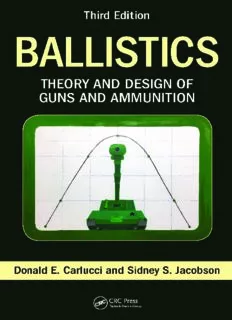
Ballistics: Theory and Design of Guns and Ammunition, Third Edition PDF
Preview Ballistics: Theory and Design of Guns and Ammunition, Third Edition
BALLISTICS Theory and Design of Guns and Ammunition Third Edition http://taylorandfrancis.com BALLISTICS Theory and Design of Guns and Ammunition Third Edition Donald E. Carlucci Sidney S. Jacobson CRCPress Taylor&FrancisGroup 6000BrokenSoundParkwayNW,Suite300 BocaRaton,FL33487-2742 ©2018byTaylor&FrancisGroup,LLC CRCPressisanimprintofTaylor&FrancisGroup,anInformabusiness NoclaimtooriginalU.S.Governmentworks Printedonacid-freepaper InternationalStandardBookNumber-13:978-1-138-05531-5(Hardback) Thisbookcontainsinformationobtainedfromauthenticandhighlyregardedsources.Reasonableeffortshavebeenmadeto publishreliabledataandinformation,buttheauthorandpublishercannotassumeresponsibilityforthevalidityofallmaterialsor theconsequencesoftheiruse.Theauthorsandpublishershaveattemptedtotracethecopyrightholdersofallmaterialrepro- ducedinthispublicationandapologizetocopyrightholdersifpermissiontopublishinthisformhasnotbeenobtained.Ifany copyrightmaterialhasnotbeenacknowledgedpleasewriteandletusknowsowemayrectifyinanyfuturereprint. ExceptaspermittedunderU.S.CopyrightLaw,nopartofthisbookmaybereprinted,reproduced,transmitted,orutilizedinany formbyanyelectronic,mechanical,orothermeans,nowknownorhereafterinvented,includingphotocopying,microfilming,and recording,orinanyinformationstorageorretrievalsystem,withoutwrittenpermissionfromthepublishers. For permission to photocopy or use material electronically from this work, please access www.copyright.com (http://www .copyright.com/)orcontacttheCopyrightClearanceCenter,Inc.(CCC),222RosewoodDrive,Danvers,MA01923,978-750- 8400.CCCisanot-for-profitorganizationthatprovideslicensesandregistrationforavarietyofusers.Fororganizationsthathave beengrantedaphotocopylicensebytheCCC,aseparatesystemofpaymenthasbeenarranged. TrademarkNotice:Productorcorporatenamesmaybetrademarksorregisteredtrademarks,andareusedonlyforidentification andexplanationwithoutintenttoinfringe. LibraryofCongressCataloging-in-PublicationData Names:Carlucci,DonaldE.,author.|Jacobson,SidneyS.,author. Title:Ballistics:theoryanddesignandammunition/DonaldE.Carlucci& SidneyS.Jacobson. Description:Thirdedition.|BocaRaton:Taylor&Francis,2018.| Includesbibliographicalreferencesandindex. Identifiers:LCCN2017044302|ISBN9781138055315(hardback)| ISBN9781315165967(ebook) Subjects:LCSH:Ballistics. Classification:LCCUF820.C282018|DDC623/.51–dc23 LCrecordavailableathttps://lccn.loc.gov/2017044302 VisittheTaylor&FrancisWebsiteat http://www.taylorandfrancis.com andtheCRCPressWebsiteat http://www.crcpress.com Contents Preface tothe Third Edition.........................................................................................................xi Preface tothe Second Edition....................................................................................................xiii Preface tothe First Edition..........................................................................................................xv Authors........................................................................................................................................xvii Section I Interior Ballistics 1. Introductory Concepts ..........................................................................................................3 1.1 Ballistic Disciplines.......................................................................................................4 1.2 Terminology..................................................................................................................4 1.3 Units and Symbols.......................................................................................................5 2. Physical Foundation of Interior Ballistics ........................................................................7 2.1 Ideal Gas Law...............................................................................................................7 2.2 Other GasLaws..........................................................................................................13 2.3 Thermophysics and Thermochemistry....................................................................15 2.4 Thermodynamics........................................................................................................20 2.5 Combustion.................................................................................................................24 2.6 Solid Propellant Combustion....................................................................................36 2.7 Fluid Mechanics..........................................................................................................45 References...............................................................................................................................65 3. Analytic andComputational Ballistics ...........................................................................67 3.1 Computational Goal...................................................................................................67 3.2 Lagrange Gradient......................................................................................................68 3.3 Lagrange Gradient forSpherical and CubicGrains..............................................96 3.4 Chambrage Gradient................................................................................................100 3.5 Numerical Methods in Interior Ballistics..............................................................102 3.6 Sensitivities and Efficiencies...................................................................................106 References.............................................................................................................................108 4. Ammunition Design Practice ..........................................................................................109 4.1 Stress andStrain.......................................................................................................109 4.2 Failure Criteria..........................................................................................................112 4.3 Ammunition Types..................................................................................................116 4.4 Propellant Ignition....................................................................................................117 4.5 Gun Chamber............................................................................................................117 4.6 Propellant Charge Construction.............................................................................118 4.7 Propellant Geometry................................................................................................119 4.8 Cartridge Case Design.............................................................................................120 4.9 Projectile Design.......................................................................................................123 v vi Contents 4.10 Shell Structural Analysis.........................................................................................124 4.11 Buttress Thread Design............................................................................................144 4.12 Sabot Design..............................................................................................................152 References.............................................................................................................................160 Further Reading...................................................................................................................160 5. WeaponDesign Practice ..................................................................................................161 5.1 Fatigue and Endurance............................................................................................161 5.2 Tube Design...............................................................................................................163 5.3 Gun Dynamics..........................................................................................................169 5.4 Muzzle Devices andAssociated Phenomena.......................................................175 5.5 Gas-Operated Guns..................................................................................................183 Gun Dynamics Nomenclature...........................................................................................193 References.............................................................................................................................194 Further Reading...................................................................................................................194 6. Recoil Arresting and Recoilless Guns ..........................................................................195 6.1 Recoil Arresting........................................................................................................195 6.2 Muzzle Brakes...........................................................................................................196 6.3 Trench Mortar...........................................................................................................197 6.4 Recoilless Guns.........................................................................................................198 6.5 Interior Ballistics ofRecoilless Guns......................................................................200 References.............................................................................................................................202 Section II Exterior Ballistics 7. Introductory Concepts ......................................................................................................207 7.1 Definitions..................................................................................................................207 7.2 Development ofTotal Yaw Anglefrom Orthogonal Measurements...............216 References.............................................................................................................................220 Further Reading...................................................................................................................220 8. Dynamics Review ..............................................................................................................221 Reference...............................................................................................................................236 Further Reading...................................................................................................................236 9. Trajectories .........................................................................................................................237 9.1 Vacuum Trajectory...................................................................................................237 9.2 Simple AirTrajectory (Flat Fire).............................................................................245 9.3 Wind Effects on aSimple AirTrajectory...............................................................262 9.4 Generalized PointMass Trajectory........................................................................273 9.5 Six Degree-of-Freedom (6 DOF) Trajectory..........................................................282 9.6 Modified Point MassTrajectory.............................................................................300 9.7 Probability ofFirst Round Hit................................................................................311 References.............................................................................................................................314 Further Reading...................................................................................................................315 Contents vii 10. Linearized Aeroballistics .................................................................................................317 10.1 Linearized Pitching and YawingMotions............................................................319 10.2 Gyroscopic and DynamicStabilities......................................................................329 10.3 Yaw ofRepose..........................................................................................................336 10.4 Roll Resonance..........................................................................................................337 References.............................................................................................................................339 11. Mass Asymmetries ............................................................................................................341 References.............................................................................................................................343 12. Lateral Throwoff ................................................................................................................345 12.1 Static Imbalance........................................................................................................348 12.2 Dynamic Imbalance..................................................................................................349 References.............................................................................................................................354 13. SwerveMotion ...................................................................................................................355 13.1 Aerodynamic Jump..................................................................................................355 13.2 Epicyclic Swerve.......................................................................................................359 13.3 Drift.............................................................................................................................361 Reference...............................................................................................................................361 14. Nonlinear Aeroballistics ..................................................................................................363 14.1 Nonlinear Forces and Moments.............................................................................363 14.2 Bilinear and Trilinear Moments..............................................................................366 References.............................................................................................................................369 Section III Terminal Ballistics 15. Introductory Concepts ......................................................................................................373 16. Penetration Theories .........................................................................................................377 16.1 Penetration andPerforation ofMetals..................................................................377 16.2 Penetration andPerforation ofConcrete...............................................................397 16.3 Penetration andPerforation ofSoils......................................................................404 16.4 Penetration andPerforation ofCeramics..............................................................410 16.5 Penetration andPerforation ofComposites.........................................................417 References.............................................................................................................................420 17. Penetration of Homogeneous,Ductile Chromium–Nickel Steel Naval Armor by ThreeRepresentative Designs ofNondeforming Hardened Steel Armor-Piercing Projectiles withBare Noses ...............................................................421 17.1 Introduction...............................................................................................................421 17.2 Properties ofIron and Steel Materials Usedin Ship Construction and Armor.................................................................................................................422 17.3 Wrought Iron............................................................................................................424 viii Contents 17.4 Cast Iron.....................................................................................................................425 17.5 Steel.............................................................................................................................426 17.6 Projectiles...................................................................................................................431 17.6.1 US ArmyWWII15 lb (6.8kg), 3in. (76.2mm) M79 Armor-Piercing Monobloc Shot................................................................432 17.6.2 Experimental 3in. (76.2 mm)and 0.78in. (20mm) Flat-Nosed Projectiles.................................................................................432 17.6.3 Experimental 13lb, 3 in.Tapered Flat-Nose AP Projectile withSmall Conical Windscreen................................................................435 17.7 Details onthe M79Nose Shape Effects on Armor Penetration vs. Standard STS Plate.............................................................................................439 17.7.1 Normal Impact Results..............................................................................439 17.7.1.1 Very Thin-Plate Regime.............................................................439 17.7.1.2 Midthickness-Plate Regime.......................................................440 17.7.1.3 Thick-Plate Regime.....................................................................442 17.7.2 Oblique Impact Results..............................................................................443 17.7.3 Base-First Penetration.................................................................................448 17.8 US Army WWIIM79 APProjectile Penetration ofAverage-Strength US Navy WWIISTS.................................................................................................449 17.9 More Detailed Definition ofArmor Penetration for Ogival Projectiles............451 17.10 Residual Velocity and Projectile Exit Angle.........................................................452 17.11 Basic Ogival Penetration Formulas andDefinitions...........................................454 17.12 Program Formulas, Data Sets, and Evaluation Logic.........................................459 17.12.1 Obliquity Angles up to45°.......................................................................469 17.12.2 Obliquity Angles over 45°.........................................................................475 17.12.3 Base-First Penetration at q = 65° orGreater...........................................477 References.............................................................................................................................478 18. Shock Physics .....................................................................................................................479 18.1 Shock Hugoniots.......................................................................................................479 18.2 Rarefaction Waves....................................................................................................495 18.3 Stress Waves inSolids.............................................................................................517 18.4 Detonation Physics...................................................................................................535 18.5 Explosive’sEquations of State................................................................................554 18.5.1 JWL Equation ofState................................................................................554 18.5.2 JWLBEquation of State..............................................................................555 18.5.3 Analytic CylinderModel...........................................................................556 References.............................................................................................................................559 Further Reading...................................................................................................................560 19. Introduction toExplosive Effects ...................................................................................561 19.1 Gurney Method.........................................................................................................561 19.2 Taylor Angles............................................................................................................565 19.3 Mott Formula............................................................................................................569 References.............................................................................................................................575 Further Reading...................................................................................................................575 Contents ix 20. Shaped Charges .................................................................................................................577 20.1 Shaped Charge Jet Formation.................................................................................579 20.2 Shaped Charge Jet Penetration...............................................................................587 References.............................................................................................................................598 Further Reading...................................................................................................................598 21. WoundBallistics ................................................................................................................599 References.............................................................................................................................609 Further Reading...................................................................................................................609 AppendixA.................................................................................................................................611 AppendixB.................................................................................................................................621 Index.............................................................................................................................................627
Description: